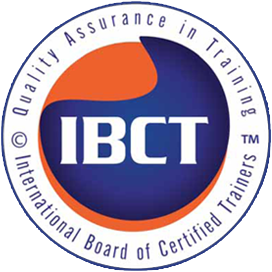IBCT Code of Ethics and Professional Conduct
The Board enforces the Code by receiving and investigating all complaints of violations then taking a disciplinary action if needed.Why Code of Ethics and Conduct?
our well-articulated code of conduct clarifies IBCT’s mission, values and principles, linking them with standards of professional conduct. The code articulates the values that IBCT wishes to foster in its certified trainers and HRD professionals and, in doing so, defines desired behavior. As a result, written codes of conduct and ethics can become benchmarks against which individual and organizational performance can be measured.
Additionally, our code is a central guide and reference for IBCT Certifies trainers to support their day-to-day decision making. A code encourages discussions of ethics and compliance, empowering trainers to handle ethical dilemmas they encounter in everyday work/training. It can also serve as a valuable reference, helping trainers locate relevant documents, services and other resources related to ethics within their organizations.
THE CODE
Preamble
The Board enforces the Code by receiving and investigating all complaints of violations and by taking disciplinary action, including revocation of certification against any member who is personally found to be guilty of Code violation, or who as a professional employee, or officer of a training consulting organization, is found to be willfully supporting a practice of Code violation. In the final analysis, it is the desire for the respect and confidence of the profession, and of the society that should motivate the trainer to maintain the highest possible ethical conduct. The loss of that respect and confidence is the ultimate sanction. Members who don’t comply with the behavioral code will be removed from the directory of Certified Trainers after conducting a proper investigation to confirm their deviant behavior.
Purposes of The Code
Code of Ethics
Members and IBCT certified trainers must:
- Act with integrity, competence, diligence, respect, and in an ethical manner with the public, clients, prospective clients, trainees, clients’ employees, colleagues in the profession, and other participants in the global HRD markets.
- Place the integrity of the profession and the interests of clients above their own personal interests.
- Use reasonable care and exercise independent professional judgment when conducting training evaluation, providing recommendations, taking HRD actions, and engaging in other professional activities.
- Practice and encourage others to practice in a professional and ethical manner that will reflect credit on themselves and the profession.
- Promote the integrity of IBCT, and uphold the IBCT rules governing IBCT Train-the-Trainer programs.
- Maintain and improve their professional competence and strive to maintain and improve the competence of their clients according to IBCT standards.



